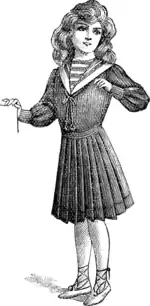
A sailor dress is a child's or woman's dress that follows the styling of the sailor suit, particularly the bodice and collar treatment. A sailor-collared blouse is called a middy blouse ("middy" derives from "midshipman").[1] In early 20th-century America, sailor dresses were very popularly known as Peter Thomson dresses after the former naval tailor credited with creating the style.[2]
Peter Thomson dress

Peter Thomson (sometimes spelled Thompson)[3] had tailoring establishments in New York and Philadelphia in around 1900.[4] His original sailor dresses and suits, for both women and children (including young boys), are represented in several American museum collections including the Metropolitan Museum's Costume Institute,[5] and the Philadelphia Museum of Art.[6] The 'Peter Thomson dress' was made from cotton or linen for summer wear, or wool in winter.[7] It was promoted as an ideal costume or uniform for female students and schoolchildren, and was popular with those trying to establish a "standardized style" of clothing.[8][9] By 1919, the Peter Thomson dress was regarded as a valid option for school uniforms, and was described as synonymous with "good taste for girls of 14-18 years old for many years."[9] Peter Thomson styling was also applied to the bodices of early bathing costumes.[10]
Dresses with sailor styling were known before the Peter Thomson design took hold. In Sweden in 1887, a sailor dress with natural waist and pleated skirt was among the designs promoted by the dress reform movement as appropriate for young girls.[11]
Late 20th century and early 21st century
Although sailor styling is sometimes seen on women's dresses, since the mid-20th century it is mainly associated with dresses for babies and small children.[12] During the late 20th century sailor styling became associated with maternity dresses, which has led to some negativity towards sailor styles for womenswear and the general idea of a woman dressing 'like a child'.[13] The maternity clothing designer Liz Lange declared "She shouldn't have to dress like a child just because she's having a child; it's one thing to put a toddler in a sailor suit but it's another thing completely to condemn a grown woman to such a fate."[14]
See also
References
- ↑ Lewandowski, Elizabeth J. (2011). The complete costume dictionary. Lanham, Md.: Scarecrow Press, Inc. ISBN 9780810840041.
- ↑ Brooks Picken, Mary (1923). Textiles and sewing materials: Textiles, laces, embroideries and findings, shopping hints, mending, household sewing, trade and sewing terms. International textbook company. p. 250.
A kind of dress worn by young girls, the waist of which is made in exact imitation of a sailor's blouse. This style of dress derives its name from its creator, Peter Thomson, who was a tailor in the navy...
- ↑ The Flapper 00:29:13
- ↑ "Suit: Peter Thomson (American) Date: 1902". The Collection Online. Metropolitan Museum of Art. Retrieved 25 September 2014.
- ↑ "Sailor Suit: Peter Thomson (American) Date: ca. 1900". The Collection Online. Metropolitan Museum of Art. Retrieved 25 September 2014.
- ↑ "Boy's Sailor Suit: Shirt and Knickers". Search the Collections: Philadelphia Museum of Art. Philadelphia Museum of Art. Retrieved 25 September 2014.
- ↑ Mrs. Mathews (January 1916). "Neglected Fraternity Opportunities". The Anchora of Delta Gamma. Delta Gamma Fraternity. p. 168. (originally printed in The Alpha Phi Quarterly
- ↑ Przybyszewski, Linda (2014). "Much for Little". The Lost Art of Dress The Women Who Once Made America Stylish. New York: Basic Books. p. 1944. ISBN 9780465080472.
- 1 2 Dwyer-McNulty, Sally (2014). "School Uniforms: A New Look for Catholic Girls". Common threads : a cultural history of clothing in American Catholicism (1 [edition]. ed.). UNC Press Books. pp. 102–104. ISBN 9781469614090.
- ↑ Gold, Annalee (1991). 90 years of fashion. New York: Fairchild Fashion Group. p. 61. ISBN 9780870056802.
- ↑ Cunningham, Patricia A. (2003). Reforming women's fashion, 1850-1920 : politics, health, and art. Kent: Kent State University Press. ISBN 9780873387422.
- ↑ Lee, Jaeil; Steen, Camille (2014). Technical sourcebook for designers (Second ed.). New York: Bloomsbury Pub. p. 107. ISBN 9781609018566.
- ↑ Iovine, Vicky (2007). The Girlfriends' Guide to Pregnancy. Simon and Schuster. pp. 129, 131, 135. ISBN 9781416551874.
- ↑ Lange, Liz (2003). Liz Lange's maternity style : how to look fabulous during the most fashion-challenged time (1. ed.). New York: Clarkson Potter. p. 8. ISBN 9780609809174.
